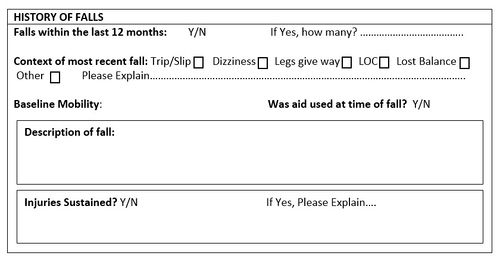Excitement About Dementia Fall Risk
Excitement About Dementia Fall Risk
Blog Article
5 Easy Facts About Dementia Fall Risk Shown
Table of ContentsSome Ideas on Dementia Fall Risk You Should KnowThe 7-Second Trick For Dementia Fall RiskHow Dementia Fall Risk can Save You Time, Stress, and Money.Getting The Dementia Fall Risk To WorkSome Ideas on Dementia Fall Risk You Should Know
You could be nervous due to the fact that you've had an autumn prior to or because you've seen you're starting to really feel unsteady on your feet. You may have noticed adjustments to your health and wellness, or simply feel like you're decreasing a little. Whatever the factor, it isn't uncommon to become careful and shed confidence, and this can stop you doing the important things you used to do and make you feel a lot more separated.If you have actually had a fall or you've started to feel unstable, inform your medical professional even if you feel fine otherwise. Your physician can examine your equilibrium and the way you walk to see if improvements can be made. They may have the ability to refer you for a drops danger analysis or to the drops avoidance solution.
This details can be obtained through interviews with the individual, their caregivers, and an evaluation of their medical records. Begin by asking the individual regarding their history of drops, including the frequency and situations of any current drops. Dementia Fall Risk. Ask about any kind of flexibility problems they might experience, such as unstable or trouble strolling
Conduct a thorough review of the individual's medications, paying particular focus to those recognized to raise the threat of drops, such as sedatives or medicines that lower high blood pressure. Identify if they are taking multiple drugs or if there have been recent changes in their drug routine. Examine the individual's home environment for potential hazards that can raise the threat of falls, such as poor lighting, loosened rugs, or lack of grab bars in the washroom.
The 20-Second Trick For Dementia Fall Risk
Guide the person via the autumn risk assessment kind, discussing each concern and recording their reactions properly. Compute the total risk score based on the actions given in the assessment form.
This strategy might consist of workout programs to improve strength and balance, medicine modifications, home alterations, and references to other specialists as needed. Regularly keep track of the individual's development and reassess their danger of drops as required. Customize the treatment strategy based upon modifications in their health and wellness standing or home setting. Supply recurring education and learning and assistance to advertise security and minimize the danger of falls in their everyday living activities.
Many studies have actually shown that physical treatment can assist to decrease the threat of dropping in adults ages 65 and older. In a brand-new research study (that looked at drops risk in females ages 80 and older), scientists calculated the financial impact of picking physical therapy to stop falls, and they located that doing so saves $2,144, consisting of all the covert costs of your time, discomfort, missed out on life events, and the bucks paid for solutions.
8 Easy Facts About Dementia Fall Risk Explained
Examining your balance, toughness, and strolling capability. A home safety and security assessment. check this site out Based on the analysis results, your physical specialist will certainly design a strategy that is tailored to your specific requirements.
Older grownups that have problem strolling and speaking at the very same time are at a higher risk of falling. Dementia Fall Risk. To help raise your safety throughout daily activities, your physical specialist may design a training program that will test you to maintain standing and strolling while you do an additional task. Instances consist of walking or standing while counting blog here backwards, having a discussion, or carrying a bag of groceries
Your physical therapist also can recognize which activities you must stay clear of to remain risk-free. Community-based drops avoidance programs aid individuals to: Decrease their fear of falling. Establish goals for raising their physical task. Make their homes much safer. Work out extra to raise their strength and equilibrium. These programs frequently are led by volunteer trains.
All About Dementia Fall Risk

Measles, or rubeola, is a highly infectious, severe viral transmittable condition triggered by the measles infection. Some individuals consider measles as simply a breakout and fever that cleans up in a few days; nevertheless, measles can create significant health and wellness issues, specifically in children younger than 5-years-old. The most effective security versus measles is the measles, mumps, and rubella (MMR) injection.
Autumns are an usual cause of injury amongst older adults.
All About Dementia Fall Risk

She has no background see of drops, her stride is constant, and she invalidates with no concerns. The previous registered nurse states that she calls for help to the shower room when she needs to go.
Examples of common fall interventions/measures include: Ensuring a patient's important items are within reach. Placing the person's bed rails up with the alarm system on. Helping an individual while they're standing up from bed. Beyond recognizing exactly how to make use of the Johns Hopkins Loss Threat Analysis Device, it is very important that centers include its usage right into a much more extensive fall avoidance strategy.
Report this page